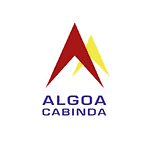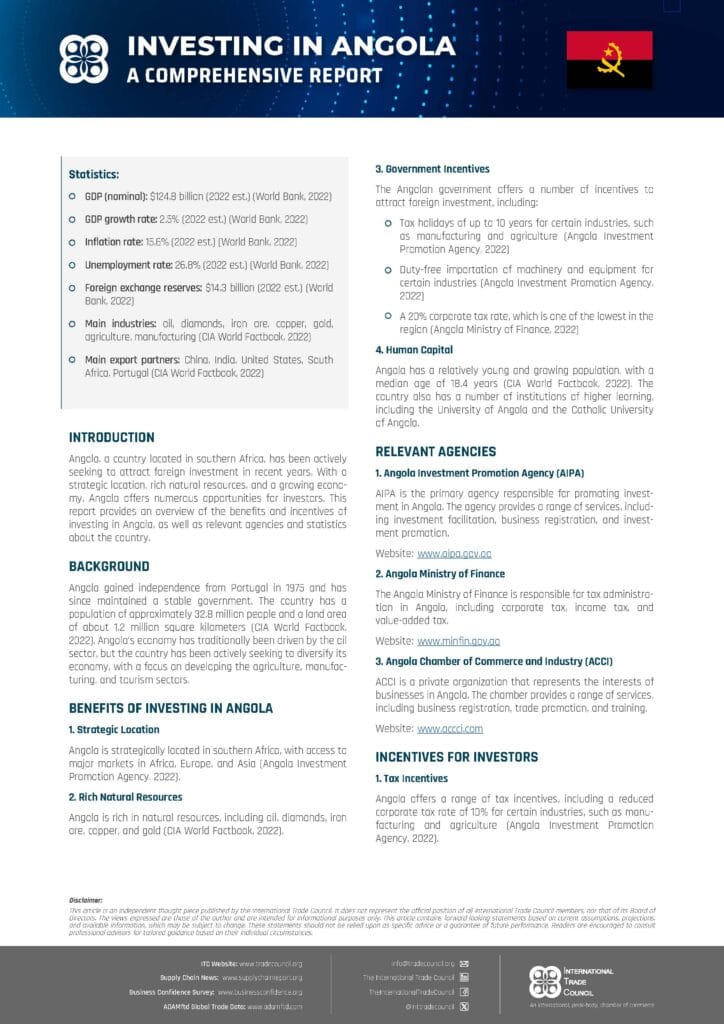- Type of Government: Presidential Republic
- Population: Approximately 35 million (as of 2023)
- GDP: Around $114 billion USD
- Corporate Tax Rate: 25%
- Personal Income Tax Rate: Progressive, up to 25%
- Major Exports: Crude oil, diamonds, refined petroleum, gas, coffee
- Major Imports: Machinery, electrical equipment, vehicles, foodstuffs, pharmaceuticals
Doing Business with Angola
A comprehensive guide to doing business, exporting, investing, and manufacturing in Angola.
-
Research Market Requirements
- Understand Angola’s import regulations and standards.
- Identify demand for your product in Angola.
-
Product Compliance
- Ensure your product meets Angola’s quality and safety standards.
- Obtain necessary certifications and documentation.
-
Find an Importer or Partner
- Identify potential local partners or importers.
- Establish a relationship and negotiate terms.
-
Register Your Business
- Register with relevant Angolan authorities if required for your sector.
-
Prepare Documentation
- Invoice
- Packing list
- Bill of lading or airway bill
- Certificate of origin
- Any product-specific certificates (e.g., health, safety)
-
Customs Clearance
- Submit documents to Angolan customs.
- Pay any applicable duties and taxes.
-
Shipping and Logistics
- Choose a reliable shipping company.
- Ensure proper packaging and labeling according to Angolan regulations.
-
Contact Key Government Agencies
- Ministry of Industry and Commerce
- Angolan Customs Authority
-
Follow Up on Delivery
- Confirm receipt and satisfaction with the importer.
- Address any issues promptly.
Key Contacts
- Ministry of Industry and Commerce
- Website: Ministry of Industry and Commerce
- Customs Authority
- Website: Angolan Customs
-
Research Import Regulations
- Understand Angola’s import rules and requirements.
- Check if your goods require special permits or licenses.
-
Register as an Importer
- Register your business with the Angolan authorities.
- Obtain an import license if necessary.
-
Find a Supplier
- Identify and establish a relationship with a reputable supplier.
- Negotiate terms and conditions.
-
Arrange Shipping and Logistics
- Select a reliable freight forwarder or shipping company.
- Ensure proper packaging and labeling according to Angolan standards.
-
Prepare Documentation
- Commercial invoice
- Packing list
- Bill of lading or airway bill
- Certificate of origin
- Any additional certificates required (e.g., health, safety)
-
Customs Clearance
- Submit all documents to Angolan customs.
- Pay applicable duties and taxes.
-
Compliance and Inspection
- Ensure compliance with all import regulations.
- Be prepared for potential inspections by customs officials.
-
Contact Key Government Agencies
- Ministry of Industry and Commerce
- Angolan Customs Authority
-
Receive Goods
- Arrange for transportation from the port to your warehouse or facility.
- Inspect goods upon arrival and address any issues.
Key Contacts
- Ministry of Industry and Commerce
- Website: Ministry of Industry and Commerce
- Customs Authority
- Website: Angolan Customs
-
Choose a Company Type
- Decide on the type of company (e.g., Limited Liability Company).
-
Reserve a Company Name
- Check the availability of your desired company name.
- Reserve the name with the Angolan Business Registration Office.
-
Prepare Documentation
- Draft the Articles of Association.
- Obtain identification documents for all shareholders and directors.
-
Register the Company
- Submit documents to the Guichet ÃÂÂÂÅ¡nico (One-Stop Shop).
- Pay the registration fee (approximately $500 USD).
-
Obtain a Tax Identification Number (NIF)
- Register with the Angolan Tax Authority for a NIF.
-
Open a Bank Account
- Open a corporate bank account in Angola to deposit the initial capital.
-
Register for Social Security
- Register the company and employees with the National Institute for Social Security.
-
Obtain Necessary Licenses
- Apply for any sector-specific licenses or permits required for your business.
-
Contact Key Government Agencies
- Ministry of Industry and Commerce
- Guichet ÃÂÂÂÅ¡nico
Key Contacts
- Ministry of Industry and Commerce
- Website: Ministry of Industry and Commerce
- Guichet ÃÂÂÂÅ¡nico
-
Conduct Market Research
- Analyze demand for your product in Angola.
- Study local competition and market conditions.
-
Choose a Location
- Select a suitable site considering logistics, labor availability, and utilities.
- Ensure compliance with zoning laws.
-
Register Your Business
- Incorporate your company through the Guichet ÃÂÂÂÅ¡nico.
- Obtain a Tax Identification Number (NIF).
-
Acquire Land
- Secure the necessary permits and approvals for land acquisition.
- Check for environmental regulations and compliance.
-
Obtain Necessary Permits
- Apply for construction permits.
- Obtain environmental and sector-specific licenses.
-
Set Up Infrastructure
- Plan and construct the plant facilities.
- Ensure utilities (water, electricity) are connected.
-
Hire and Train Staff
- Recruit local workforce.
- Provide necessary training and development programs.
-
Install Machinery and Equipment
- Procure and install manufacturing equipment.
- Ensure compliance with safety standards.
-
Start Production
- Begin trial runs and quality checks.
- Optimize processes for efficiency.
-
Contact Key Government Agencies
- Ministry of Industry and Commerce
- Angolan Environmental Agency
Key Contacts
- Ministry of Industry and Commerce
- Website: Ministry of Industry and Commerce
- Angolan Environmental Agency
- Website: Environmental Agency
-
Conduct a Trademark Search
- Check the availability of your trademark to ensure it’s unique.
- Use the database of the Angolan Institute of Industrial Property (IAPI).
-
Prepare Your Application
- Gather necessary documents: applicant details, trademark representation, and description of goods/services.
-
Submit the Application
- File your application with the Angolan Institute of Industrial Property (IAPI).
- Pay the application fee (approximately $200 USD).
-
Examination Process
- IAPI will examine the application for compliance with legal requirements.
-
Publication
- If approved, the trademark is published in the Industrial Property Bulletin for opposition.
-
Opposition Period
- A 60-day period during which third parties can oppose the registration.
-
Final Registration
- If no oppositions, the trademark is registered.
- Pay the registration fee (approximately $300 USD).
-
Receive Certificate
- Obtain the trademark registration certificate from IAPI.
Key Contacts
- Angolan Institute of Industrial Property (IAPI)
- Website: IAPI
-
Negotiation
- Attempt to resolve the dispute through direct negotiation between parties.
- This step can save time and costs associated with formal proceedings.
-
Mediation
- Engage a neutral third-party mediator to facilitate a resolution.
- This can be a cost-effective and confidential way to settle disputes.
-
Arbitration
- Choose arbitration if specified in the contract or agreed upon by parties.
- Faster than litigation and the decision is binding.
- Costs vary, typically including arbitrator fees and administrative expenses.
-
Litigation
- File a lawsuit in the appropriate Angolan court if other methods fail.
- Consider legal representation due to the complexity of the process.
- Court fees and legal costs will apply.
-
Court Judgment
- Await the court’s decision, which can be appealed if necessary.
Key Contacts
- Ministry of Justice and Human Rights
- Website: Ministry of Justice
- Angolan Bar Association
- Website: OAA
Social and Cultural Factors
- Language: Portuguese is the official language, essential for business communication.
- Business Etiquette: Personal relationships and trust are crucial. Be prepared for lengthy negotiations.
- Cultural Norms: Respect for hierarchy and formal greetings are important.
Political Environment
- Government: Angola is a presidential republic. Political stability has improved, but challenges remain.
- Regulations: Ongoing reforms aim to improve the business climate, but bureaucracy can be complex.
Economic Factors
- Foreign Exchange: The Angolan Kwanza (AOA) is subject to fluctuations. Currency exchange regulations can impact transactions.
- GDP and Growth: The economy is largely dependent on oil, but diversification efforts are underway.
Rule of Law
- Legal System: Based on Portuguese civil law. Contract enforcement can be slow.
- Corruption: Transparency has improved, but corruption remains a concern in some sectors.
Infrastructure
- Development: Infrastructure is developing, with improvements in transportation and energy sectors.
- Challenges: Some areas still face issues with reliable access to utilities.
Key Contacts and Resources
- Angola National Agency for Private Investment (ANIP)
- World Bank Angola Overview: World Bank
- Angolan Chamber of Commerce and Industry: CCIA
Ask our Experts on Doing Business in/with Angola
If you’re looking to do business or invest in Angola, we can provide expert guidance, market insights, and valuable connections to help you navigate the local landscape. Contact us today to discover how we can assist in making your venture a success.






